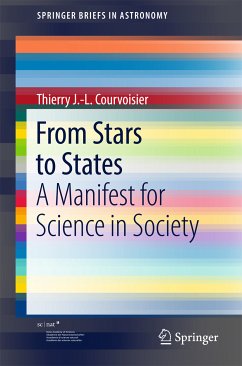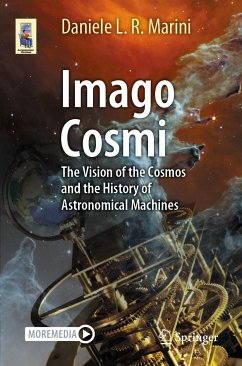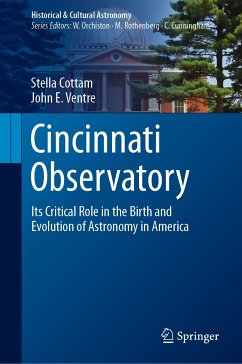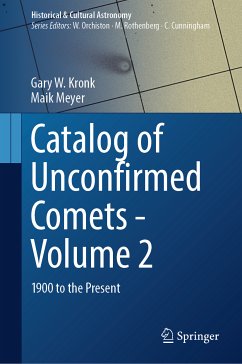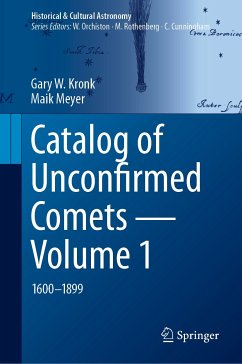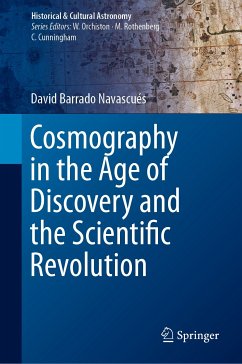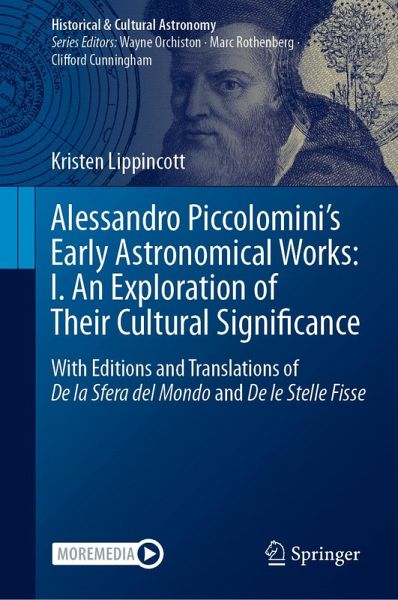
Alessandro Piccolomini's Early Astronomical Works: I. An Exploration of Their Cultural Significance (eBook, PDF)
With Editions and Translations of De la Sfera del Mondo and De le Stelle Fisse
Versandkostenfrei!
Sofort per Download lieferbar
120,95 €
inkl. MwSt.
Weitere Ausgaben:

PAYBACK Punkte
60 °P sammeln!
This book presents the first interdisciplinary study of Alessandro Piccolomini's two early astronomical works - De la Sfera del Mondo and De le Stelle Fisse. First published in Venice in 1540, the two treatises are amongst the earliest scientific texts written in the vernacular (Italian) and were specifically composed to make astronomical principles and practices available to a lay reader.The book includes modern editions of the original Italian texts and an English translation of both treatises (all appended as Electronic Supplementary Material to the online edition), while also examining the...
This book presents the first interdisciplinary study of Alessandro Piccolomini's two early astronomical works - De la Sfera del Mondo and De le Stelle Fisse. First published in Venice in 1540, the two treatises are amongst the earliest scientific texts written in the vernacular (Italian) and were specifically composed to make astronomical principles and practices available to a lay reader.
The book includes modern editions of the original Italian texts and an English translation of both treatises (all appended as Electronic Supplementary Material to the online edition), while also examining the contents of each treatise in depth. It explores the way in which Piccolomini addresses the theoretical underpinnings of the science of astronomy in his De la Sfera del Mondo by providing a version of Sacrobosco's De sphaera, which he has expanded and updated to include the views of more recent natural philosophers and astronomers. The book also presents an extended study ofDe le Stelle Fisse and the unique method that Piccolomini devised for observing the stars, as well as explanatory notes on the sources behind his explanations of the mythographic sources of each constellation.
In addition to this, the book presents a detailed examination of the cultural context in which Piccolomini wrote his treatises, focussing on such issues as how astronomy was taught in Italian universities in the 16th-century; the on-going debates on the viability of Italian as language as a means for discussing scientific ideas; and how Piccolomini navigated through the competitive and complicated world of book production in 16th-century Venice. Given that Piccolomini originally dedicated both treatises to his female friend, the Sienese aristocrat Laudomia Forteguerri, there is also a discussion of the mysteries behind their personal relationship; of the dynamics of Sienese society at the time; and, in particular, the role that the Sienese Accademia degli Intronati played in Piccolomini's own intellectual development and the composition of his astronomical treatises.
This book is a companion volume to Alessandro Piccolomini's Early Astronomical Works: II. An Examination of Their Scientific Content by Elly Dekker in the same series. The two volumes are jointly available as print set with ISBN 978-3-031-76964-1.
The book includes modern editions of the original Italian texts and an English translation of both treatises (all appended as Electronic Supplementary Material to the online edition), while also examining the contents of each treatise in depth. It explores the way in which Piccolomini addresses the theoretical underpinnings of the science of astronomy in his De la Sfera del Mondo by providing a version of Sacrobosco's De sphaera, which he has expanded and updated to include the views of more recent natural philosophers and astronomers. The book also presents an extended study ofDe le Stelle Fisse and the unique method that Piccolomini devised for observing the stars, as well as explanatory notes on the sources behind his explanations of the mythographic sources of each constellation.
In addition to this, the book presents a detailed examination of the cultural context in which Piccolomini wrote his treatises, focussing on such issues as how astronomy was taught in Italian universities in the 16th-century; the on-going debates on the viability of Italian as language as a means for discussing scientific ideas; and how Piccolomini navigated through the competitive and complicated world of book production in 16th-century Venice. Given that Piccolomini originally dedicated both treatises to his female friend, the Sienese aristocrat Laudomia Forteguerri, there is also a discussion of the mysteries behind their personal relationship; of the dynamics of Sienese society at the time; and, in particular, the role that the Sienese Accademia degli Intronati played in Piccolomini's own intellectual development and the composition of his astronomical treatises.
This book is a companion volume to Alessandro Piccolomini's Early Astronomical Works: II. An Examination of Their Scientific Content by Elly Dekker in the same series. The two volumes are jointly available as print set with ISBN 978-3-031-76964-1.
Dieser Download kann aus rechtlichen Gründen nur mit Rechnungsadresse in A, B, BG, CY, CZ, D, DK, EW, E, FIN, F, GR, HR, H, IRL, I, LT, L, LR, M, NL, PL, P, R, S, SLO, SK ausgeliefert werden.





